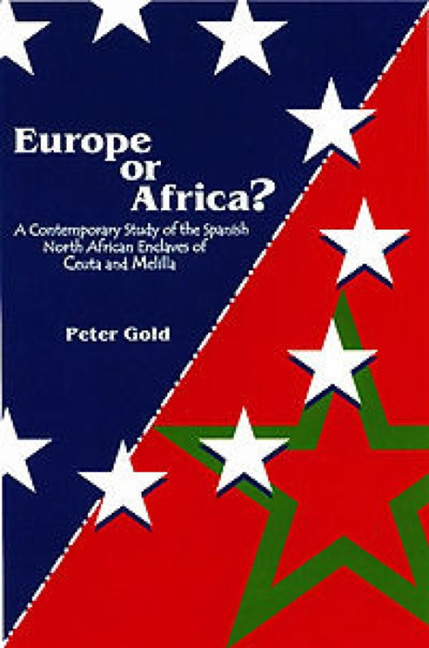Book contents
- Frontmatter
- Dedication
- Contents
- Acknowledgement
- List of figures and tables
- Map
- Introduction
- 1 The impact of the enclaves on Spanish–Moroccan relations
- 2 The enclaves within the Spanish state: the autonomy statutes
- 3 The evolving political landscape in the enclaves
- 4 The 1985 Immigration Law and community relations in the enclaves
- 5 The enclaves: a migration gateway to Europe
- 6 The enclaves: Europe or Africa?
- 7 Gibraltar and the enclaves
- 8 Conclusion: looking to the future
- References
- Index
5 - The enclaves: a migration gateway to Europe
- Frontmatter
- Dedication
- Contents
- Acknowledgement
- List of figures and tables
- Map
- Introduction
- 1 The impact of the enclaves on Spanish–Moroccan relations
- 2 The enclaves within the Spanish state: the autonomy statutes
- 3 The evolving political landscape in the enclaves
- 4 The 1985 Immigration Law and community relations in the enclaves
- 5 The enclaves: a migration gateway to Europe
- 6 The enclaves: Europe or Africa?
- 7 Gibraltar and the enclaves
- 8 Conclusion: looking to the future
- References
- Index
Summary
As the only territories which provide a land border between the EU and Africa, Ceuta and Melilla act as magnets for would-be illegal migrants to continental Europe from all over the African continent. Because the towns have a unique position, this chapter focuses on an examination of the specific role of the North African enclaves in illegal immigration. However, because illegal immigration is symptomatic of the whole south–north migration process, the part played by the enclaves is placed in the wider context of the immigration issue between Africa and Europe.
There are three types of illegal immigrant moving across from North Africa into the EU via Spain. First, there are those who enter legally, having obtained a fixed-term visa as a tourist or student, for example, but who once in the EU disappear thanks to a support network of compatriots which enables them to stay indefinitely or until caught by police. They usually end up working without contracts for low wages and are difficult to track down. Second, there are those who try to enter through established entry-ports but do so using false documentation – either passports, work contracts or residence permits. Their fate is often similar to the first group. Most of these two types of immigrant enter during the summer months when there is a mass migration of about one million North Africans travelling across the Strait of Gibraltar and customs and immigration officers are often overwhelmed by the sheer numbers of people in what has become known as ‘Operation Passage Across the Strait’ (Operación Paso del Estrecho).
The third form of immigration from North Africa is carried out on the back of well-established Moroccan networks of tobacco and cannabis traffickers. These organizations are linked to European networks which, once the immigrants have reached Spain, transport them to other parts of the country and beyond. People-smuggling – some refer to it as ‘the new slave trade’, estimated to be worth US$7,000 million world-wide (El País, 7 August 1998) – has become an increasingly attractive proposition to these groups in recent years, especially since 1991 when the numbers started to rise, because the profits are high and the penalties if caught are less severe than for drugs or arms trafficking.
- Type
- Chapter
- Information
- Europe or Africa?A Contemporary Study of the Spanish North African Enclaves of Ceuta and Melilla, pp. 120 - 150Publisher: Liverpool University PressPrint publication year: 2000



